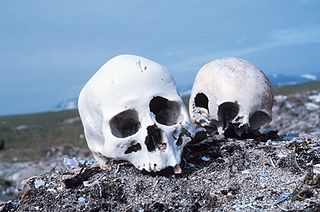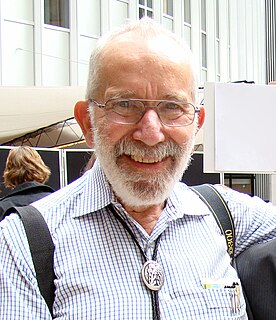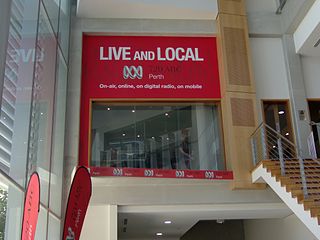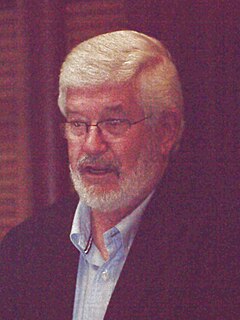
Forensic pathology is pathology that focuses on determining the cause of death by examining a corpse. A post mortem is performed by a medical examiner, usually during the investigation of criminal law cases and civil law cases in some jurisdictions. Coroners and medical examiners are also frequently asked to confirm the identity of a corpse. Also see forensic medicine.

ABC Radio National, known on-air as RN, is an Australia-wide Public Service Broadcasting radio network run by the Australian Broadcasting Corporation.

Karl Kruszelnicki ; often referred to as "Dr Karl", is an Australian science communicator and populariser, who is known as an author, and as a science commentator on Australian radio and television.

Television in Australia began experimentally as early as 1929 in Melbourne with radio stations 3DB and 3UZ, and 2UE in Sydney, using the Radiovision system by Gilbert Miles and Donald McDonald, and later from other locations, such as Brisbane in 1934.

John Robin Warren AC is an Australian pathologist, Nobel Laureate and researcher who is credited with the 1979 re-discovery of the bacterium Helicobacter pylori, together with Barry Marshall. The duo proved to the medical community that the bacterium Helicobacter pylori is the cause of most peptic ulcers.

Radio Adelaide is Australia's first community radio station; established by Adelaide University in 1972. The signal reaches across the Adelaide metropolitan area to the Mid North, the Yorke Peninsula and Fleurieu Peninsula, the southern Barossa, Kangaroo Island, Riverland and parts of the Eyre Peninsula broadcasting at 13 kilowatts on 101.5 MHz FM. The transmitter power was only 7 kW until an upgrade on 2 November 2006.
A Current Affair is an Australian current affairs program airing weeknights on the Nine Network. The program is currently presented by Tracy Grimshaw.

ABC Radio Perth is a radio station located in Perth, Western Australia, operated by the Australian Broadcasting Corporation, and broadcasting at 720 kHz AM. It is the flagship ABC Local Radio station in Western Australia.

ABC Classic is a classical music radio station available in Australia and internationally. Its website features classical music news, features and listening guides. It is operated by the Australian Broadcasting Corporation (ABC).
SA Pathology,, is an organisation providing diagnostic and clinical pathology services throughout South Australia.
Robert James Champion de Crespigny, AC is a multi-millionaire Australian businessman and founder of Normandy Mining Limited. In 2004 his personal wealth was approximately $170 million. He has held numerous influential positions in corporate and public life, including serving as chancellor of the University of Adelaide (2000-2004) and chair of the South Australian Economic Development Board (2002-2006). As of 2014, he continues to advise the Government of South Australia through his role on the South Australian Minerals & Petroleum Expert Group (SAMPEG) for the Department of State Development. He currently resides in the United Kingdom.

Brian Kenneth Hobbs (1937–2004) was a medical doctor in Adelaide, South Australia and chair of Community Aid Abroad. He was prominently involved in Aboriginal health in Australia.
ABC Radio Adelaide is the ABC Local Radio station for Adelaide. It is broadcast at 891 kHz on the AM band.
Michael Smyth is an Australian journalist and broadcaster based in Adelaide, South Australia.
Donncha Ó Dúlaing is a veteran Irish broadcaster from Doneraile, County Cork, who is known country-wide and among the Irish around the world for his cultural and traditional music programmes.
Richard Morecroft is an English-born Australian radio announcer, TV newsreader and presenter, and conservationist. He presented the Adelaide News bulletin, before becoming the long-running host of the nightly bulletin of ABC News Sydney from 1983 until 2002. Between 2010 and 2012, he hosted the quiz show Letters and Numbers.

Keith Conlon, LL.B. 1968, B.A. 1968, OAM, is a veteran Australian broadcaster based in Adelaide.
Norman Swan is a Scottish Australian physician, journalist and broadcaster.
Sir Constantine Trent Champion de Crespigny,, generally referred to as C. T. C. de Crespigny or Sir Trent de Crespigny, was a medical doctor, pathologist, academic and hospital administrator in Adelaide, South Australia. "Champion de Crespigny", which is mostly applied to male members of the family, has often been treated as though it were a surname.















